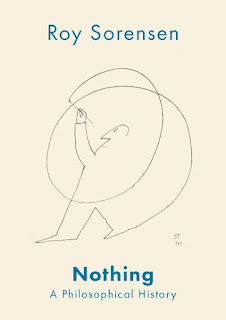 and A Cabinet of Philosophical Curiosities. Prior to joining the UT Austin faculty in 2019, he taught at University of Delaware, New York University, Dartmouth College, and Washington University in St. Louis.
and A Cabinet of Philosophical Curiosities. Prior to joining the UT Austin faculty in 2019, he taught at University of Delaware, New York University, Dartmouth College, and Washington University in St. Louis.
Sorensen applied the “Page 99 Test” to his new book, Nothing: A Philosophical History, and reported the following:
The page 99 test works for Nothing! The page concerns Socrates’ teacher Anaxagoras who believed that everything is in everything. Page 99 includes a little bit of every type of thing there is. That means it also contains every page of my book!Learn more about Nothing: A Philosophical History at the Oxford University Press website.
Page 99 refers to a geometrical construction on page 98. This is the Pythagorean Pentagram, a star formed from three intersecting triangles. (The Pythagoreans wore it as badge of membership in their sect.) At the intersection of the three triangles is a pentagon. At the center of the pentagon is the star again. The construction proceeds in endless miniaturization. Each pentagon is pregnant with a pentagram. Each pentagram is pregnant with a pentagon.
Anaxagoras abhors nothingness (like every ancient Greek philosopher except the atomists). Nothing can come from nothing! Everything comes from something. Thales thought that something was one type of thing – water. But Anaxagoras denies that fire can be reduced to water. Like can only come from like.
You cannot make a man out of something that had no manly ingredients. You need semen. The semen contains little men. The little men must contain littler men (because the son contains the ingredients for the grandson). If the semen falls on the ground, then it can nourish a plant. So semen must also contain plants. There really is no limit on the fertility of semen. So semen must contain a little bit of everything. And those little bits must themselves contain littler bits of everything. What goes for semen, goes from everything. Semen is just a pellucid illustration of the `All in all’ principle.
Nothing: A Philosophical History pairs each thinker with an absence: Lao Tzu = absence of action, Buddha = absence of wholes, ... , Arthur Schopenhauer = absence of meaning, Bertrand Russell = absence of referents. In between the dots is: Anaxagoras = absence of total absences. A pure sample would have a total absence of everything else. So Anaxagoras thinks there is no such thing as pure sample. Every sample is a complete mixture containing every type of thing. Consequently, everything is a representative sample of everything.
The point of Ford Madox Ford’s Page 99 Test was to avoid the biased sample offered by the first pages of a book or its back-cover synopsis (which have extra editorial care). Therefore, Anaxagoras is not the perfect philosopher for Ford. Nevertheless, Anaxagoras is good enough to make me critical of the way Ford changed his name in 1919 from Ford Madox Hueffer (to fulfill the terms of a small legacy). Ford should have changed his name to Ford M. Ford. When asked what the initial M. stands for, he could then answer Ford M. Ford. (Inspiration: Asked what the B stands for in the name of the fractal geometer Benoit B. Mandelbroit, one mathematician quipped Benoit B. Mandelbroit.)
--Marshal Zeringue



